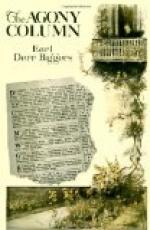“Too bad!” he said. “Really too bad! The man had courage and, beyond all doubt, brains. But—this is most considerate of him. He has saved me such a lot of trouble.”
The colonel effected my release at once; and he and I walked down Whitehall together in the bright sun that seemed so good to me after the bleak walls of the Yard. Again he apologized for turning suspicion my way the previous day; but I assured him I held no grudge for that.
“One or two things I do not understand,” I said. “That letter I brought from Interlaken—”
“Simple enough,” he replied. “Enwright—who, by the way, is now in the Tower—wanted to communicate with Fraser-Freer, who he supposed was a loyal member of the band. Letters sent by post seemed dangerous. With your kind assistance he informed the captain of his whereabouts and the date of his imminent arrival in London. Fraser-Freer, not wanting you entangled in his plans, eliminated you by denying the existence of this cousin—the truth, of course.”
“Why,” I asked, “did the countess call on me to demand that I alter my testimony?”
“Bray sent her. He had rifled Fraser-Freer’s desk and he held that letter from Enwright. He was most anxious to fix the guilt upon the young lieutenant’s head. You and your testimony as to the hour of the crime stood in the way. He sought to intimidate you with threats—”
“But—”
“I know—you are wondering why the countess confessed to me next day. I had the woman in rather a funk. In the meshes of my rapid-fire questioning she became hopelessly involved. This was because she was suddenly terrified she realized I must have been watching her for weeks, and that perhaps Von der Herts was not so immune from suspicion as he supposed. At the proper moment I suggested that I might have to take her to Inspector Bray. This gave her an idea. She made her fake confession to reach his side; once there, she warned him of his danger and they fled together.”
We walked along a moment in silence. All about us the lurid special editions of the afternoon were flaunting their predictions of the horror to come. The face of the colonel was grave.
“How long had Von der Herts held his position at the Yard?” I asked.
“For nearly five years,” Hughes answered.
“It seems incredible,” I murmured.
“So it does,” he answered; “but it is only the first of many incredible things that this war will reveal. Two months from now we shall all have forgotten it in the face of new revelations far more unbelievable.” He sighed. “If these men about us realized the terrible ordeal that lies ahead! Misgoverned; unprepared—I shudder at the thought of the sacrifices we must make, many of them in vain. But I suppose that somehow, some day, we shall muddle through.”
He bade me good-by in Trafalgar Square, saying that he must at once seek out the father and brother of the late captain, and tell them the news—that their kinsman was really loyal to his country.




